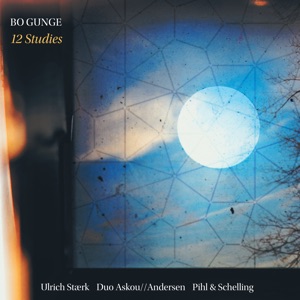The full title of this work is “12 Studies on ‘blue’ scale tones and intervals”, and it alerts us to the fact that these are not “Etudes” in the more traditional, technical sense, but studies in harmony. The actual idiom is tonal, melodic, and unfailingly pleasant, while the focus on harmony produces an eclectic variety of expressive material ranging from the mellow, pop/rock feel of Study No. 4 (“Blues without words”) to No. 8 (“Ocean Blue”), which sounds strikingly like the Bartók of the Sonata for Two Pianos and Percussion, or perhaps the third movement of Music for Strings, Percussion, and Celesta. None of the pieces lasts longer than three-ish minutes on average–some are considerably shorter–and you can enjoy them singly or in groups.The last three studies form a brief, self-contained suite on their own.
Gunge originally wrote the piece in two groups of six, one set for alto saxophone and harp, the other for violin and accordion. He then recast the whole batch for solo piano, and you get all of these arrangements on this disc expertly performed by the fine musicians for whom they were written. Now I have to confess, the accordion is a grotty sounding instrument best suited for polka bands and the like–the idea of “classical accordion” is a modern conceit that seldom works, and (for me anyway) it doesn’t here. Others may disagree. On the other hand the piano versions, while certainly better, do miss out on the violin’s ability to produce glissandos and bend the occasional note, so there are advantages and disadvantages to each medium. Also, the combination of alto saxophone and harp proves quite effective. Given their brevity it’s fun to compare the arrangements, which are conveniently coupled together study by study so as to facilitate the task.
These are, in short, pieces worth getting to know. They may not be avant-garde, or especially difficult or challenging, but the writing reveals both integrity and craft, and the disc is splendidly engineered. You can listen confident in the knowledge that both your time and money will be well spent.
































